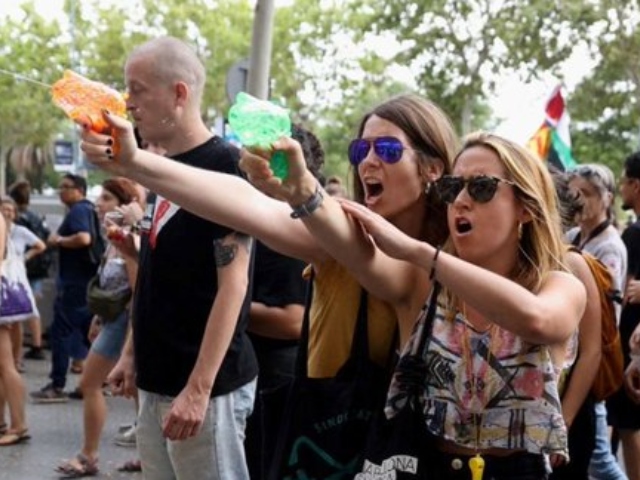
[imagesource:x/bbcnews]
Thousands of protesters, including more than 150 organisations, marched through Barcelona on Saturday, protesting that “excessive tourism” is making the Spanish city “unlivable”.
Locals blame thousands of tourists for soaring rents and have now taken to attacking them with water guns to make their point.
Protesters held up placards reading “Barcelona is not for sale” and “Tourists go home”.
Barcelona is the 20th most visited city in the world and the fifth most visited in Europe after London, Paris, Istanbul and Rome. Reaction to foreigners has been building for years, but the recent rise in the global cost of living seems to have finally pushed locals over the edge.
While protesters in Barcelona aren’t yet ready to take to the streets with pitchforks and torches, demonstrators made their point by spraying tourists along the route. The rallies have been Instagram-worthy, with widely shared images on social media of angry locals using colorful water pistols to spray tourists at street-corner cafes who were simply looking to enjoy a tasty gelato.
The Barcelona Tourism Observatory predicts that the city will welcome 15.6 million tourists and the greater Barcelona region nearly 26 million in 2023. The Department of Economy and Promotion’s Research Department estimates tourist spending in the city at 9.6 billion euros.
As with other tourist hotspots, the influx of foreign visitors has led to an increase in local services and rental prices, with popular cities such as Barcelona and Madrid seeing an 18% increase in rental prices in the last year alone.
“The city has become completely tourist-oriented. What we want is not a tourist-oriented city, but a city for its citizens.”
“Here in Barcelona, tourism has become too much for the city to live in.”
Barcelona increased its tourism tax in April and also announced plans to ban short-term rentals altogether in June, but with life in the city becoming unaffordable for many, many locals feel not enough is being done. The Spanish destination has also banned cruise ships from docking in 2023 in an effort to ease congestion and pollution.
Barcelona is not alone in battling overtourism: Japan has also taken measures to curb tourist overcrowding, even going so far as to build a wall to hide Instagram-worthy photos of Mount Fuji, and Venice has suggested it needs intervention to curb overcrowding along its waterways.
Cape Town residents probably have some sympathy for these protesters, but for us this is a double-edged sword: on the one hand, tourists flocking to Cape Town bring billions of rands to the city and its economy, but on the other, accommodating foreign tourists makes many tourist attractions and restaurants unaffordable for locals.
It doesn’t have to be one or the other, but tourist-heavy cities should find a way to accommodate locals who aren’t earning pounds or dollars.
[source:businessinsider]

